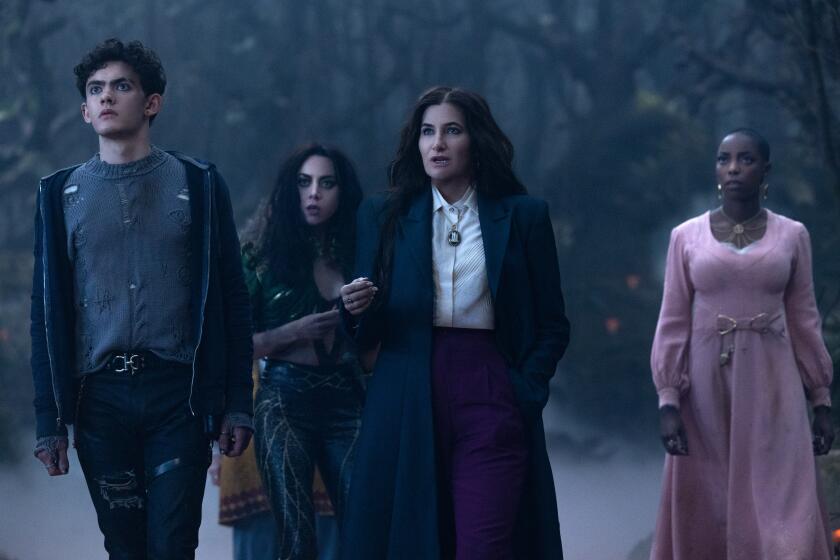L.A. plays host to Iranian film festival
Perhaps no country in the world has garnered more attention this year than Iran, from the street protests over the re-election of President Mahmoud Ahmadinejad to revelations about its nuclear program. Yet somehow in the midst of turmoil and upheaval, the country’s cinema is thriving.
Several of its leading filmmakers, screenwriters and actors are in Los Angeles for the kickoff of a 10-day film program at UCLA Film & Television Archive and the Academy of Motion Picture Arts and Sciences.
“I believe the most important achievement in this visit is to find the real faces of both cinemas, as well as opening new doors of opportunity and collaboration between Iranian and American cinema,” said Fatemah Motamed-Aria in an e-mail interview. One of the country’s most acclaimed actress, she gives a haunting performance as a mother of an ill war veteran in 2005’s “Gilaneh,” screening Oct. 16 at the Academy’s Linwood Dunn Theater.
“The cinema of America has always been inspiring and attractive,” says noted screenwriter Farhad Tohidi, in an e-mail interview. Two of his films are featured in the film program, “Havana File,” screening on Oct. 15 and “7:05 p.m.” on Oct. 16 at the Dunn.
“The filmmakers’ visit to Los Angeles is an outgrowth of an ongoing project created by the academy’s International Outreach Committee.
“The academy board members wanted to have our members out there in the world so that we may be able to connect on a cultural and educational level,” says academy programmer Ellen Harrington.
Earlier this year, another group from the academy went to Iran. “We had eight academy members -- Sid Ganis who was president at the time, Frank Pierson, a past president; Annette Bening and Alfre Woodward came representing the actor’s branch,” says Harrington.
The group was hosted in Tehran by members of the House of Cinema, which is an alliance of that country’s motion picture guild.
Harrington noted that Iran’s film culture is very sophisticated,” says Harrington.
“Their cinema is one of the most successful national cinemas anywhere in the world.”
Besides appearing at screenings of their films, the Iranian filmmakers will tour film production facilities and historical films sites and meet with students. “We have partnered with UCLA because they have one of the longest standing Iranian film festivals in the U.S.,” says Harrington.
“It is a cinema that’s very engaged first with its own cinema history and culture,” notes UCLA programmer Shannon Kelley. “It’s also a very internationally informed cinema with techniques as sophisticated as what anybody else is doing in the world. The beauty of their work translates to other cultures.”
Motamed-Aria says her country’s cinema is an outgrowth of Iran’s “deep and long background in storytelling and legendary stories from different Iranian heroes and gods.”
“Iranian cinema is very influenced by the society and its people, the everyday dialogue of the people, the language of poets and literature of our time such as Hafez, Sadi, Rumi, Ferdosi. . . . Without trying too hard, we are getting nourished in the ancient culture of Iran.”
“Our storytelling heritage and classical Iranian poetry has truly an important role in the artistic creation of our own filmmakers,” says Tohidi.
“Iranian cinema feels bound to consider morals and avoids sex and violence,” he adds. “Therefore it’s natural with all these limitations that the creative arrow is directed to the poetic, artistic aspect risen from our storytelling customs.”
Iranian filmmakers, says Harrington, “have developed a lot of great strategies for telling incredible human stories that relate to their lives. It is one of the only means in which we learn what goes on there. They have a commercial cinema, but this group of filmmakers . . . are the people who are tackling the stories of relationships between the sexes and family, what the impact of the past Iran-Iraq war [was] on their society, what happens to women in that culture and what happens to intellectuals.”
However, says Motamed-Aria, because part of the budget for films comes from the government, “depending on the officials will, the movie can be manipulated and changed. In order to show the movie in Iran and to be able to make the movie, permission is needed from the government.”
The event opens Friday evening at UCLA’s James Bridges Theater with a panel discussion featuring members of the delegation, including directors Mohammad Mehdi Asgarpour, Rakhshan Bani Etemad, Ebrahim Hatamikia, Reza Mir-Karimi, Motjabe Raie and Alireza Raisian, actors Motamed-Aria and Amin Tarokh, screenwriter Tohidi and documentarian Mojtaba Mirtahmasb and a screening of Mir-Karimi’s “As Simple as That.”
The screenings continue through Sunday at the James Bridges Theater before moving to the Linwood Dunn on Oct. 15-16. Each screening will be followed by a discussion with either the filmmaker, star or writer of the film. For more information go to www.oscars.org or www.cinema.ucla.edu.
More to Read
The biggest entertainment stories
Get our big stories about Hollywood, film, television, music, arts, culture and more right in your inbox as soon as they publish.
You may occasionally receive promotional content from the Los Angeles Times.











